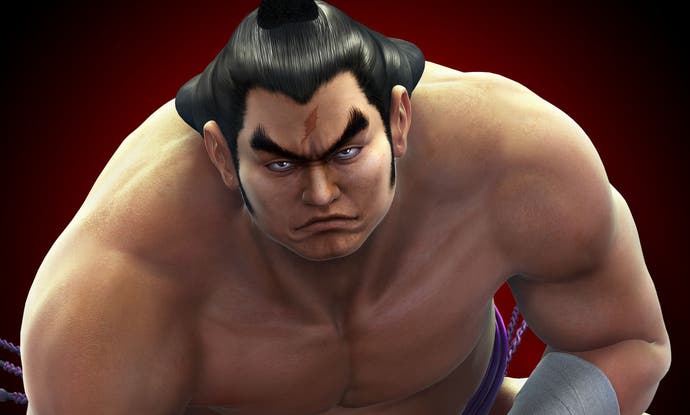Tekken 7's Harada on the thorny subject of sexy swimsuits and Western sensibilities
"There's a character called Ganryu..."
During a hands-on with Tekken 7 at Gamescom today, I spoke with Tekken's chief producer and director, Katsuhiro Harada, about a series of tweets he made recently with regards to Tekken 7's swimsuit content being released in the West.
When queried whether it would be made available in the US, Harada's now deleted reply was a short and sweet "Ask your country's SJWs. HAHAHAHAHA." He later apologised to another female fan, deleting the tweet and saying "this message is not for females," by which I think he might have meant, it was not directed exclusively at women.
I'm a big fan of Harada and Tekken in general, and have been for many years, so I asked him, does he feel genuinely constrained about what he can and can't do because of Western sensibilities? Does it really bother him?
"It is more difficult creating the game for a mass market," he replied.
"But I guess one of the things that's most frustrating is just that a lot of these criticisms are very ill-informed. The problem is that people who are Tekken fans, they say something about the game that's critical and it's not that bad because they know the content of it.
"A lot of times - the swimsuits was a good example - people who don't even play the game, they maybe just hear that there are swimsuits in it and then they say, 'Woah, you have these girls in sexy swimwear, what's wrong with you? You're such male chauvinists etc.'
"But, what they don't know is that it started off in the arcade and it's a season line, like you do for Christmas, Halloween or whatever. And it's not just the women. Robots have them, Kuma, Panda, the male characters have swimwear. It's not like we're trying to sexualise the female characters at all. But they don't go and look for that info before they criticise. So, that is pretty frustrating."

"It does affect how we announce new content," added senior game designer Michael Murray, "because we have to think, when we release this, we're not there to explain this, so people can take it as it is, or how they interpret it."
"One thing that's perhaps scary about some of these ill-informed criticisms," continued Harada, "is there's a character called Ganryu, perhaps you know him, he's a Sumo wrestler. But to someone who doesn't know Sumo, they might just say, 'There's a guy in his underwear, that's inappropriate.'
"But it's a very important part of Japanese culture. Without knowing that, to so easily make criticisms, is maybe a dangerous direction. Part of the internet, I guess you could say!"
But, in terms of swimsuits and things like that, it wouldn't stop Tekken releasing that content as DLC in the West?
"Well, I guess people forget that the game goes through very strict ratings in various countries, and the level of severity kind of changes depending on the country," Harada replied.
"But Tekken has cleared those and been released. So people who actually look into the game content have seen it and it is fine. And so, as such, as long as it passes those kind of censorship [evaluations] or whatever for that country, as judged by their government or an official organisation and not some random guy on the internet, then obviously we want to release the content so as many people can enjoy it as possible."
The subject of censorship came up one other time during our meeting. After chatting about Tekken's rich history of outlandish storylines, one of the journalists present said jokingly that perhaps there wasn't a line the series wouldn't cross when it came to robots with chainsaw arms and boxing kangaroos.
"A more serious answer to that question, though," Harada said. "Recently there are lines, I guess more than in the past. Before, it was a niche crowd, people who liked video games as a whole, but at the time when they were still largely created in Japan it was pretty much anything goes, made by the Japanese and their sensibilities.
"But now it's enjoyed by a much wider audience, it's easier for outsiders to say that game's content is not good for a particular group or ethnicity or country or religion or anything. So, in that regard there are a lot more lines that we can't cross any more, I guess you could say."








